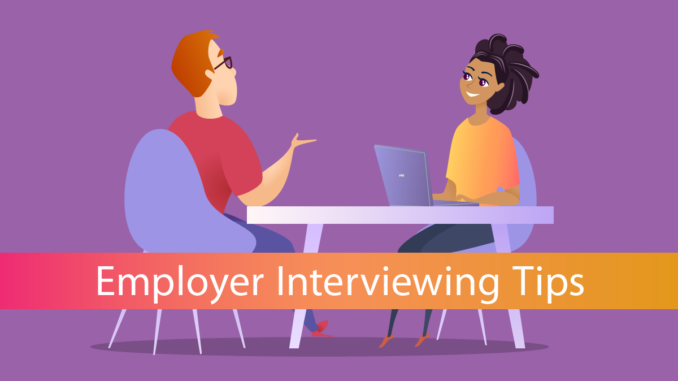
What are some top interviewing best practice for employers?
To help employers conduct effective job interviews, we asked hiring managers and business leaders for their insights. From using a panel interview system to incorporating diversity and inclusion, we received several tips for employers who want to adopt leading techniques when interviewing candidates.
Here are 10 interviewing best practices for employers:
1. Use a Panel Interview System
When interviewing candidates, it can pay to have an extra set of eyes during the process. Carrying out interviews with several members of management involved can help ensure that companies give their offers to the best candidates possible. This also acts as a check-and-balance system in the interview phase. Using a panel of diverse company representatives will help to curb any potential bias during the interview phase and provide a varied perspective on a candidate’s skills, experience, and personality. Any employer looking to create a fair, efficient hiring process should consider using a panel interview system. It’s one of the best ways to ensure you get quality hires.
Alex Chavarry, Cool Links
2. Find Out How Your Company Fits the Candidate’s Trajectory
It is always helpful to ask what an applicant’s long-term goals are. This will help you determine how your position will be beneficial to them, how they regard your company, and how long they may be with you. It will also help your recruitment efforts if you can explain how your position fits nicely into their plans. Personally, I would rather have an excellent employee for a specified amount of time, rather than a mediocre one for life. But it is something for which you can and should plan.
Denise Meridith, World’s Best Connectors
3. Update Interviewees Regarding Their Candidacy
Be transparent with candidates regarding their candidacy for a position with your company. For instance, if there are three serious contenders in the interview process, or you know a decision will be made within three weeks, make this known to the candidate. Interviewing with various companies can be stressful, so how you support your candidates speaks volumes to the culture within your organization. Lead with kindness.
Amrita Saigal, Kudos
4. Include a Subject Matter Expert in the Interviewing Process
The best way to find good candidates is to ensure they are evaluated by an equal peer or expert — it’s a huge risk to hire someone with a special skill set using just your HR team. Instead, try to include someone with knowledge of the role during the second or third round to ensure that the candidate is qualified and to clarify any of their background through the lens of a subject matter expert.
Quincy Smith, TEFL Hero
5. Find a Way to Pitch Your Company to Candidates
Interviewing should not just be seen as a way for you and your business to screen candidates. It should also be a time for you to pitch your business as a great place to work. Far too often interviewers don’t focus on how they come across in interviews, and they fail to see the value of showing the candidate why this would be a great fit for them. Interviewers should highlight their own experience working at the company and show off the company’s culture.
Brandon Brown, GRIN
6. Ask Candidates About Future Professional Goals
Do not only ask about candidates’ past work experiences. It helps if you also asked them about their professional goals for the future and how they would handle things in the workplace going forward. Responding to this question will provide a chance for them to show what they have learned from their past professional experiences and how these insights will inform their professional endeavors in the future. Suppose you only define your candidates by what they have done in the past. In that case, you could miss out on some excellent candidates whose resumes may not be as impressive, but who could still offer great value to your company.
Nick Shackelford, Structured Agency
7. Look Out for Candidate’s Passion for the Role
Look for passionate candidates. Different factors in applicants’ backgrounds can impact where they went to school or what types of internships and jobs they could take early in their careers, making these metrics unreliable. Just because someone didn’t have an opportunity previously doesn’t mean they wouldn’t take advantage of one now. Instead, focus on finding candidates who are highly motivated or inspired by the work your company does. These candidates are likely to be hard-working and driven, and their passion will motivate others around them.
Lisa Odenweller, Kroma Wellness
8. Ask Open-Ended Questions
One interviewing best practice for employers is to ask open-ended questions that allow the candidate to talk more about themselves or their ideas. Most of the time, when asked "yes-or-no" questions, candidates tend to lie just to give the answer that the interviewer wants to hear. Vocal characteristics, gestures, and even the choice of words are used as indicators of personality. Thus, by allowing candidates to talk more about themselves, an employer can not only get the actual answers to the question and learn about a candidate’s experiences, but can also get a glimpse of the candidate’s personality.
Jonathan Baillie Strong, Spotlight Podcasting
9. Standardize Your Questions and Stick to a Script
Standardizing your interview questions is better for analyzing candidates’ strengths and weaknesses. When interviewing potential job candidates, it’s in an employer’s best interest to stick to a script. This gives all candidates a level playing field, maintaining fairness and allowing employers to judge candidates without bias. If you’re worried about only getting cookie-cutter answers, there is a simple solution for that as well. Use a majority of open-ended questions that allow candidates to elaborate on the same topic in their own way. This should be enough to demonstrate the individual difference between candidates’ unique personalities and thought processes. Keep your questions standard but provide room for self-expression, and you’ll increase your chances of finding your ideal employee.
Caleb Ulffers, Haven Athletic
10. Incorporate Diversity and Inclusion
If your organization is serious about meaningful and impactful diversity, equity, and inclusion, then this must be part of your interviewing practices. This can be accomplished by ensuring that different people — and therefore different perspectives and viewpoints — are included in your hiring committees. Bring in people from outside the hiring department and include those from marginalized groups in the interview processes.
Melanie Peacock, Double M Training & Consulting
How JobsInTheUS Can Help
Since 1999, JobsInTheUS has helped employers find the top local talent they need to grow their business — through our network of state-specific job sites, including JobsInME, JobsInNH, JobsInVT, JobsInMA, JobsInRI, JobsInCT, and more.
With our popular Career Fairs, we also provide employers the opportunity to meet face-to-face with job seekers, present a company overview, discuss available positions, and respond to questions.

